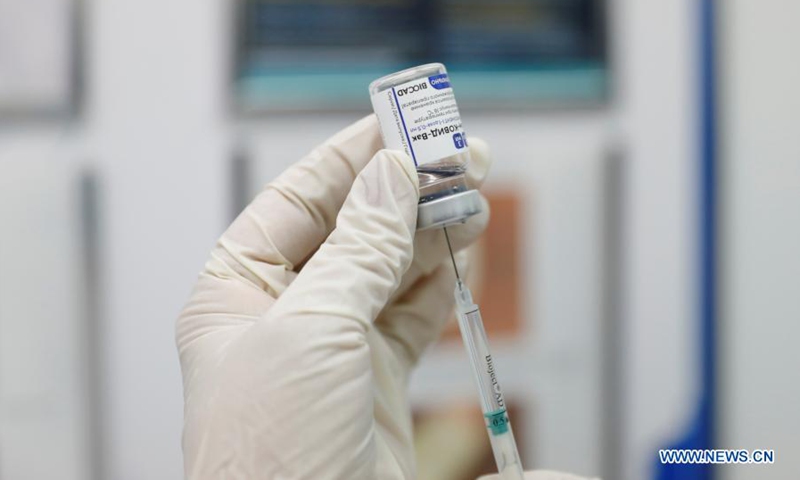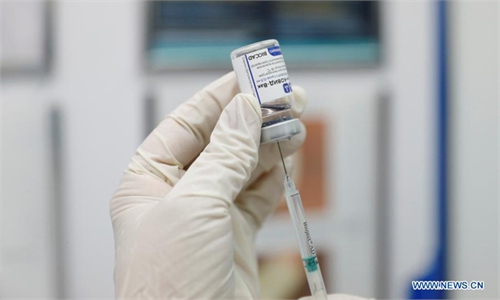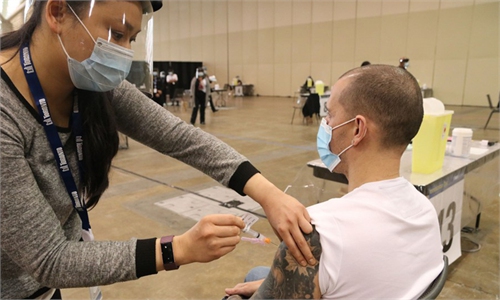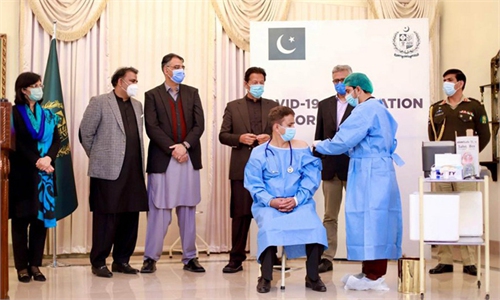Europe warms to Russian jab
Merkel ‘welcomes’ Sputnik V as trial shows 91.6% efficacy

A healthcare worker prepares to give injection of Sputnik V vaccine at a local hospital in Nur-Sultan, Kazakhstan, on Feb. 1, 2021. Kazakhstan began its coronavirus vaccination campaign Monday using Russian-made Sputnik V. According to the ministry, the vaccination, carried out on a voluntary and free basis, will continue until the end of 2021 and will cover up to 6 million people. (Photo by Kalizhan Ospanov/Xinhua)
Final-stage trial results published on Tuesday placed Russia's Sputnik V coronavirus vaccine on a par with its Western rivals, as German Chancellor Angela Merkel voiced openness to its use in the EU once it receives the regulatory nod.Sputnik V, which has already been rolled out in Russia and several other countries, was found to be 91.6 percent effective against symptomatic COVID-19 cases in trial results published by The Lancet, a leading medical journal.
"There are no arguments left for critics of this vaccine, the article in The Lancet is a checkmate," said Kirill Dmitriev, head of the Russian Direct Investment Fund (RDIF), which was part of Sputnik V's development.
German Chancellor Angela Merkel, responding to the report, said all vaccines "are welcome" in the EU, which is facing growing anger over a sluggish start to its inoculation campaign.
French President Emmanuel Macron said on Tuesday that all who want a vaccine there will be offered one "by the end of the summer" and defended the strategy "we have adopted with Germany, with the European Union, which is precisely to vaccinate in Europe."
But EU chief Ursula von der Leyen faces the deepest political crisis of her EU career so far, with politicians and citizens across the bloc voicing frustration over vaccination rates falling behind those in the US, UK and Israel.
Admitting to some missteps, Von der Leyen told the French newspaper Le Monde: "When you take urgent decisions, and in this year of crisis we've taken around 900, there's always the chance of missing something."
Von der Leyen and European leaders have been embroiled in several overlapping rows, particularly with drug firm AstraZeneca over its failure to supply enough doses and a lack of evidence of its efficacy for the over-65s.
Europe's disagreements with the firm were further underlined on Tuesday when both Sweden and France recommended AstraZeneca's jab be given only to under-65s.
Meanwhile, the number of vaccinations administered worldwide passed 100 million, but none of the world's 29 poorest countries has formally started mass inoculations.
Inoculation drives have yet to begin in some wealthy countries including Japan and Australia, which have broadly managed to contain the pandemic with strict border controls and quarantines.
Japan, where the summer Olympics are set to begin in July, has yet to even approve a vaccine and is not expected to start inoculating its population until late February at the earliest.
But the Tokyo 2020 president Yoshiro Mori insisted that the Olympics will go ahead this summer "however the coronavirus evolves."
AFP



